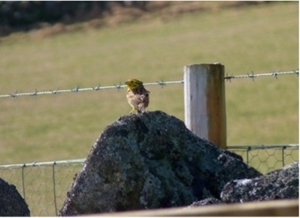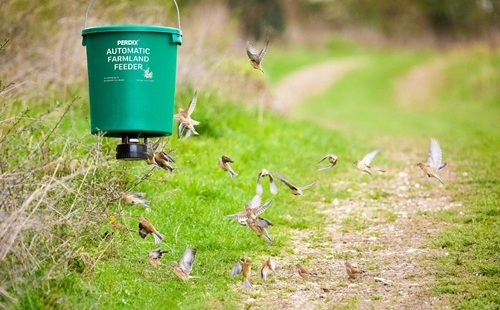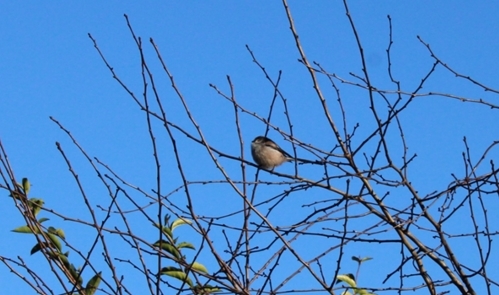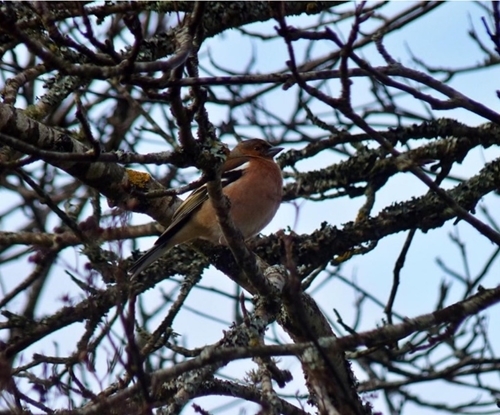By Adam Watts, Scottish Research Assistant
 The UK has long been known as a country of animal lovers, with our wildlife and countryside inspiring songs and art for centuries. However, in the UK we are also sadly one of the most nature-depleted countries in the world, and a number of our beloved species face declining populations for a variety of causes.
The UK has long been known as a country of animal lovers, with our wildlife and countryside inspiring songs and art for centuries. However, in the UK we are also sadly one of the most nature-depleted countries in the world, and a number of our beloved species face declining populations for a variety of causes.
This unfortunately includes our songbirds, with many species having seen a sharp decline in populations. Increased intensification in modern-day farming practices is often cited as being a major influence, with farmland specialists such as the yellowhammer experiencing population declines of around 70% since the 1970s. Whilst others such as the linnet and tree sparrow have been red-listed in the UK due to rapid and ongoing declines.
As a result, a number of different initiatives are being explored to aid these beautiful little birds and preserve their populations. At the Trust, we have the opportunity to support our songbird populations, and evidence best practice for aiding songbirds. That is why, this winter, we will begin supplementary winter feeding for the farmland birds here at our Game and Wildlife Scottish Demonstration Farm (GWSDF) Auchnerran, in rural Aberdeenshire.

Following in the footsteps of the Allerton Project and the PARTRIDGE project, we aim to replicate the successes they have seen on local songbird populations because of winter feeding. We will be distributing 16 songbird feeders across a variety of microhabitats on the farm with the intention of addressing the winter hunger gap.
 A long-tailed tit during the winter. (Credit: Adam Watts)
A long-tailed tit during the winter. (Credit: Adam Watts)
Feeding songbirds during the winter months is shown to increase their winter survival and gives them an advantage in preparing for the breeding season, which is what we are aiming to see here at Auchnerran too. The songbird feeders will be intended to address the “hunger gap”. This is a period from November to March/April when there is a natural shortage of food availability for songbirds.
This can lead to a survival risk for individuals and lower body condition for those surviving through to the breeding season. By provisioning a reliable food source during this period, we aim to ensure higher adult survival rates and better body condition in these vulnerable populations. The aim then is to ensure a greater number of healthy and strong breeding adults come the breeding season, and therefore better breeding success rates.
In the past, songbirds have been shown to readily utilise songbird feeders, and will regularly visit reliable food sources over winter. This can be seen even in how regularly they use small garden bird feeders up and down the country! We are therefore hoping to see similar success in the feeders we are using here, which will be stocked up to provide a large and reliable source of food.
 Male chaffinch at GWSDF Auchnerran. (Credit: Max Wright)
Male chaffinch at GWSDF Auchnerran. (Credit: Max Wright)
Our 16 songbird feeders will cover a diversity of habitats ranging from woodland to open fields, rushes and hedgerows across the farm. By distributing the feeders across a range of different habitats, we aim to be able to support a wide diversity of different bird species that span across the farm’s diverse landscape here at GWSDF Auchnerran. These feeders will then be monitored remotely using camera traps to assess usage, as well as which species are benefitting most from the supplementary feed.
If you would like to support our work here conserving songbirds, you can sponsor a feeder. Our feeders cost £80 to buy distribute, fill and maintain for the winter hunger gap, so support is greatly appreciated. By supporting this initiative, you will not only be benefitting our songbirds at GWSDF Auchnerran, but also aiding scientific research on how to utilise feeders best, potentially benefitting songbird populations across the UK.
Additionally, when sponsoring a feeder, we will be able to send you pictures of songbirds using your feeder so you can see first hand the songbirds you are supporting. With your help we can continue our research and hopefully help preserve the dawn chorus for generations to come.
Sponsor a Feeder →